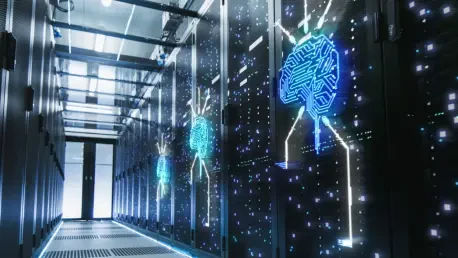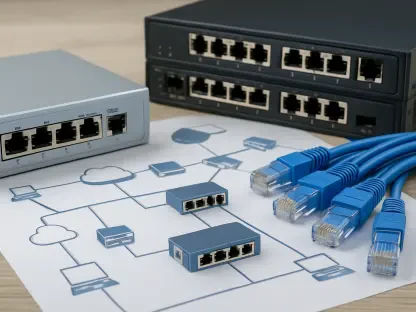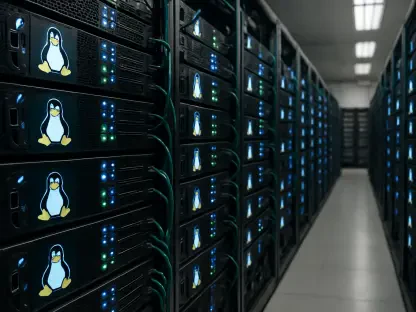In the fast-paced world of artificial intelligence, the need for webscale networking solutions that can sustain ultra-reliable performance has become increasingly crucial. Traditional data center infrastructures are struggling to meet the demands posed by both AI and standard workloads, necessitating innovative and robust solutions. This article explores how Nokia’s advanced networking solutions are shaping the future of AI-driven data centers, ensuring flexibility, reliability, and efficiency to manage the ever-evolving technology landscape.
Meeting the Demands of Modern Data Centers
Reliability and Simplicity
The imperative for modern data centers to handle the substantial loads created by AI applications is driving the need for reliability in webscale networks. Nokia’s Data Center Fabric solution epitomizes this necessity, characterized by its superior software quality and extensive hardware platforms. By eliminating defects and ensuring optimal performance, the solution supports the heavy computational demands of AI workloads. This quality assurance is fundamental to delivering the high-performance computing required for cutting-edge technological developments.
Additionally, the emphasis on simplicity is crucial in minimizing downtime and maximizing operational efficiency. Simplified network management reduces complexities and ensures that data centers remain agile and responsive to new challenges. By streamlining processes, Nokia’s solutions enable data centers to maintain a high level of operational health.
Flexibility and Adaptability
One of the standout features of Nokia’s offerings is their inherent flexibility, catering to the rapidly changing requirements of modern networks. The SR Linux network operating system (NOS) exemplifies this adaptability. It integrates cutting-edge network AI tools, fostering openness, extensibility, and resilience within data centers and cloud infrastructures. This flexibility allows operators to fine-tune their networks for peak performance, accommodating various workloads and evolving demands.
Flexibility in network management is paramount in today’s age, where the nature of demands can shift rapidly. For enterprise networks, the ability to pivot and recalibrate in response to both anticipated and unforeseen challenges can dictate success. The modularity of SR Linux NOS grants operators the control they need to respond adaptively, ensuring network reliability and performance continuity.
Minimizing Human Error through Automation
The role of automation in ensuring network reliability cannot be understated. Nokia’s Event-Driven Automation (EDA) platform exemplifies this by simplifying network operations and preemptively addressing potential issues. Utilizing advanced AI Ops, the platform identifies faults before they escalate, maintaining the consistent reliability that modern data centers demand. Automation streamlines processes and alleviates the burden on human operators, reducing the likelihood of errors and enhancing overall efficiency.
In data centers, human intervention, while indispensable, can also introduce errors due to the complexity of modern network systems. Automation mitigates these risks by providing consistent and reliable responses to routine and critical scenarios. Event-Driven Automation facilitates seamless integration of AI Ops, ensuring that troubleshooting and corrective actions are swift, effective, and minimize operational disruptions.
Seamless Communication and Efficient Traffic Management
Data Center Gateway
Managing and controlling traffic is a critical component of modern data center operations, ensuring seamless communication across cloud environments, the internet, and end-users. Nokia’s Data Center Gateway (DCGW) ensures high-efficiency traffic management, providing reliable and secure connections. This tool is pivotal for dynamically connecting customers to required services, balancing the load and maintaining consistent service quality.
Traffic management is fundamental to maintaining a harmonious network environment, where data can be routed efficiently and securely without compromising on speed or reliability. DCGW’s capabilities ensure that data flows seamlessly, avoiding bottlenecks and maintaining optimal throughput, which is crucial for supporting highly demanding AI-driven applications.
Scalable Cloud Infrastructures
As the trend toward cloud-based solutions continues to grow, the necessity for scalable cloud infrastructures that can support AI-driven services has never been more apparent. Nokia’s holistic approach addresses the growing need for IP interconnection and peering, enabling dynamic customer connections across private, public, and hybrid cloud environments. This capacity for scalability underpins the ability of data centers to evolve and expand in line with emerging technological advancements, ensuring enduring relevance and competitiveness.
Scalability is essential in ensuring that network infrastructures can rapidly adapt to increasing demands. With the proliferation of AI and its integration into various sectors, the need for quickly scalable data center solutions has become evident. Nokia’s scalable cloud infrastructure service caters to this need, providing flexible, reliable solutions designed to support future advancements and evolving industry demands.
Future-Ready Innovations
Advancing towards Highly Scalable Solutions
Future-ready innovations are vital for data centers looking to sustain growth and meet the demands of next-generation cloud services. Nokia’s comprehensive networking solutions embody this forward-thinking approach, emphasizing scalability, reliability, and performance. Through advancements in technology, such as Data Center Fabric and SR Linux NOS, Nokia is positioned to effectively meet the complex demands of AI-driven workloads, ensuring that data centers are equipped for future challenges.
Innovation is the cornerstone of sustainable growth in technology. As AI continues to expand its influence, the networking solutions that support these computationally intensive applications must evolve. Nokia’s commitment to innovation ensures that its solutions are always on the cutting edge, prepared to address the future landscape of AI and high-performance computing.
Enabling Webscale Companies to Thrive
Webscale companies, which often operate on the leading edge of technological advancements, rely on robust and scalable solutions to maintain competitive advantage. Nokia’s solutions deliver the reliability, adaptability, and efficiency needed for these companies to thrive. By integrating the latest technologies and addressing the evolving needs of modern data centers, Nokia ensures that webscale companies can provide seamless and dependable services, crucial for sustaining growth in an increasingly competitive market.
As webscale companies continue to push the boundaries of technological innovation, the need for dependable networking solutions has grown proportionately. Nokia’s commitment to providing cutting-edge networking solutions designed to handle the rigors of AI and modern workloads ensures that these leading companies can continue to innovate without compromise, maintaining their status at the forefront of technological advancement.
Ensuring Seamless and Dependable Services
In the rapidly advancing realm of artificial intelligence, there’s an urgent demand for webscale networking solutions capable of delivering exceptionally reliable performance. Traditional data center infrastructures are increasingly inadequate to handle the demands of both AI-based and standard workloads, prompting a need for innovative and robust solutions. This article delves into how Nokia’s cutting-edge networking technologies are revolutionizing the landscape of AI-driven data centers. Nokia’s solutions ensure flexibility, reliability, and efficiency, effectively addressing the dynamic challenges posed by evolving technologies. By implementing these advanced networking solutions, data centers can better manage and optimize the vast computational needs associated with AI, ensuring that performance remains stable and scalable. As technology continues to advance, Nokia stands at the forefront, providing the necessary tools and infrastructure to support the future of artificial intelligence and its applications.









